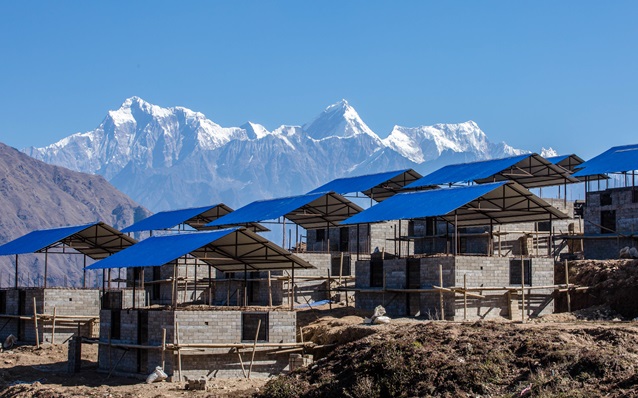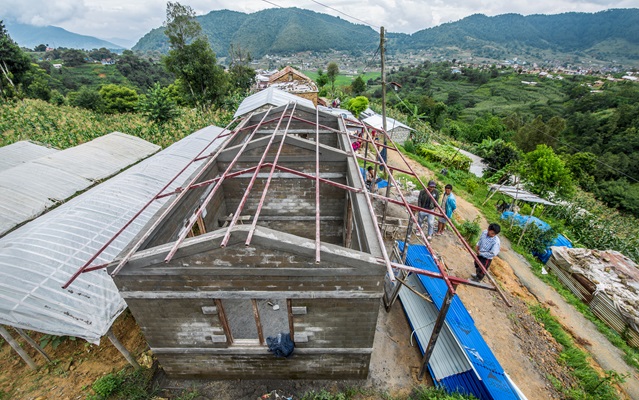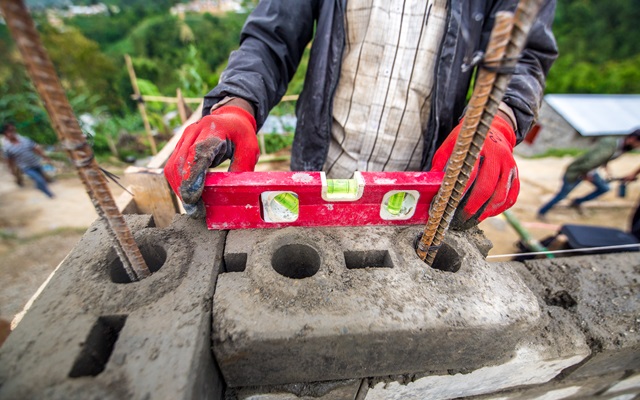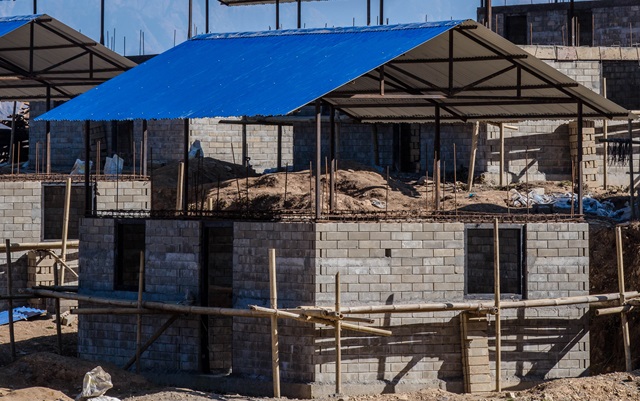Eco-friendly bricks for affordable, resilient housing

Nepal’s brick industry contributes significantly to climate change with its high CO2 emissions. Coupled with homes that do not meet safety standards and are vulnerable to increasing disasters such as floods and landslides, millions of residents are at risk. Conventional housing materials are carbon-intensive and unaffordable, especially for rural and low-income communities.
This IKI Small Grants project supports low-income groups by replacing carbon-intensive fired bricks with Compressed Stabilized Earth Bricks (CSEB). CSEB is a recognized eco-friendly and disaster-resilient technology widely used by low-income groups due to its high strength and low cost. The project supports micro-enterprises to scale up CSEB production and use through training and demonstrations. Low-income women, youth, and disadvantaged groups receive on-the-job training in eco-friendly brick production and construction combined with linkage to enterprises and employers.
INITIAL SITUATION
The fired brick industry is one of the biggest climate problems in Nepal, accounting for 37 per cent of national CO2 emissions. Its impacts include severe air pollution and the contamination of the Himalayan glacier, which provides drinking water for 1.5 billion people in South Asia. In addition, 49 per cent of Nepal’s housing stock does not meet safety standards. Combined with the increasing frequency of climate change-induced disasters such as floods, landslides, and extreme weather events, this is estimated to put millions of people at risk. Conventional resilient building materials such as baked bricks are carbon-intensive and unaffordable, especially for rural and low-income communities. Low-income and disadvantaged populations are at risk of being left behind, lacking resilient shelter and income, and are vulnerable to disaster and disease.
TARGET GROUP
The project targets 50 enterprises and 15 local governments in rural and semi-urban areas in six districts: Ilam, Jhapa, Morang, Sunsari, Panchthar, and Udayipur in Nepal. The main beneficiaries of the project are low-income families and disadvantaged groups, who gain access to safe and low-cost housing. In total, 800 houses are built offering a capacity for 4,000 people
APPROACH AND ACTIVITIES
The project aims to contribute to climate change mitigation and greenhouse gas reduction by replacing fired bricks with eco-friendly bricks for affordable, resilient housing. The project sensitises and capacitates 50 enterprises and 15 local governments in six districts to endorse and implement the eco-friendly option in their buildings, policies, and plans.
The project focuses on capacity building and awareness raising in local governments aiming towards the goal of at least four of the selected local governments include eco-friendly bricks in government policy. From an assessment of 25 local governments, a total of 15 are selected for the project. Further, the project provides design, drawing, analysis, and engineering services for the construction using eco-friendly bricks. In addition, the project cooperates with stakeholders in the research and inbuilding sector, such as engineers, architects, and NGOs to achieve two objectives. Firstly, for joint advocacy and the development of norms, guidelines, and specifications for eco-friendly CSEB bricks. Secondly, for capacity building and awareness raising.
Lastly, the project works with the Institute of Engineering to optimise and standardise the components of CSEB to decrease the content of cement. The Institute of Engineering also acts as official certification partner in this project. Thus, the project creates tangible results: 50 enterprises are scaled up, 15 municipalities are capacitated, 800 eco-friendly houses are built, 200 jobs are created, and 750 persons are trained. The enterprises are deeply embedded in each community and operate long-term, resulting in a year-on-year CO2 reduction of 4,127 tons by the end of the project period, serving as a replicable blueprint for scale up in other areas.
GALLERY
CAPACITY DEVELOPMENT
IKI Small Grants supports Community Impact Nepal in their organisational capacity development through:
- Training of trainers to improve the skills of the staff and partners
- Structural analysis and surveying
- Public procurement training
- Gender equality and social inclusion training
- Primavera project management tool
ABOUT THE ORGANISATION
Community Impact Nepal is a registered non-profit company and social purpose organisation with the mission to fight poverty and build a resilient, climate-friendly future in Nepal. The organisation was founded after the 2015 earthquake and focuses on the promotion of eco-friendly, disaster resilient construction. The organisation is headquartered in Kathmandu but is working with eco-brick enterprises all over Nepal.



